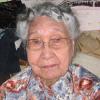
Digital Asset Information
Project: Nome Communities of Memory
Date of Interview: Feb 3, 1996
Narrator(s): Lela Oman
After clicking play, click on a section to navigate the audio or video clip.
Sections
Effect of 1918 flu epidemic on two villages near Nome
Returning wages because prediction of death
Finding their sick mothers
Effect of telephone lines on saving people outside of Nome
Protecting the villages with armed guards
Click play, then use Sections or Transcript to navigate the interview.
After clicking play, click a section of the transcript to navigate the audio or video clip.
Transcript
And I would like to talk about our area of Nome, especially old, old stories, our religion and our beliefs and what kind of regards we have towards our animals and birds and all living things on this earth.
Down at Cape Nome, what we call Ayak, at one time there were two large villages. The one on this one side, that the Triggs are living on now, was called Ayachigara.
And on the other side was Kipiluk. Kipiluk means "steep bank next to the waterway."
And James Oksoktaurak's father, Frank Oksoktaurak, was born there. And there were two large villages.
David Joe, Robert Joe's father, told me the stories of those two villages.
During the big influenza epidemic here in 1918, there were still big villages down there. David Joe and his friend, they were teenagers, but they were working for people that had four hundred dogs at Safety.
And they-- While they were working there, they had a cook. A large woman. And lots of skipjacks were caught at Safety Lagoon.
And with a little laugh he would tell me, that woman was so large she had to eat. She ate-- And skipjacks are fish about so long.
She ate twelve for breakfast, twelve for lunch, and twelve for supper. This morning I was just thinking of it and that's 36 of them in one day.
And they heard that their people were very sick and were dying. And those two boys had families right there at Ayachigara, Cape Nome.
And they wanted to go and see their people, their relatives. And their boss told them, "When you get there, I'm sure you're going to die.
So you give me the money that I had paid you." So, they obeyed him and gave him their money, because they were sure that they were going to die. And they walked from Safety from Ayachigara.
And when they got to that big village, that one on this side, there was only smoke coming out of two smokestacks.
And they were David Joe's family's igloo and that boy's family's igloo. David remembered that when he went in, his mother was the only one that was alive.
She raised her head and she said, "I am so glad you came." And she laid her head right back on her pillow and she died. And David went out.
And he saw that other boy had gone into his family's home and the mother did the same thing. She just raised her head and said, "I am so glad you are here."
And that was in 1918. I was three years old then.
What saved us up north was Nome had already put up telephone wire from here to Council and from Council to Dime Creek and from Dime Creek to Candle.
Those were big mining places at one time. They'd telephone to-- On this telephone was the only thing that saved the North people.
In Candle, when they received that message, dogteams went to Deering and to Shishmaref telling everybody up there not to come down this way.
And at Shishmaref, there were guards, sentries, what you would call. WIth guns. If anybody started coming up this way, shoot to kill. All winter long they were marooned up there.
And towards May, it was kind of warm. At that time people walked a lot. A man went to-- From Wales went to Shishmaref. And there were two men there with their guns and they said they knew this man.
He even kneeled down on the snow and cried. Because that's a long ways to be walking from Shishmaref back to Wales. So they let him in. And after that happened, people started visiting each other.

